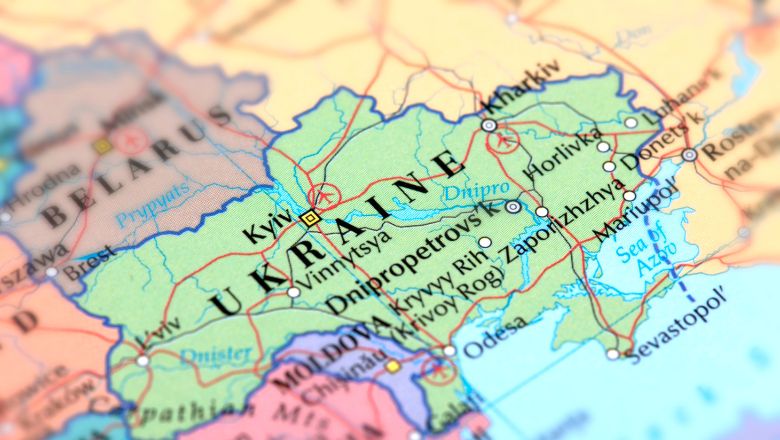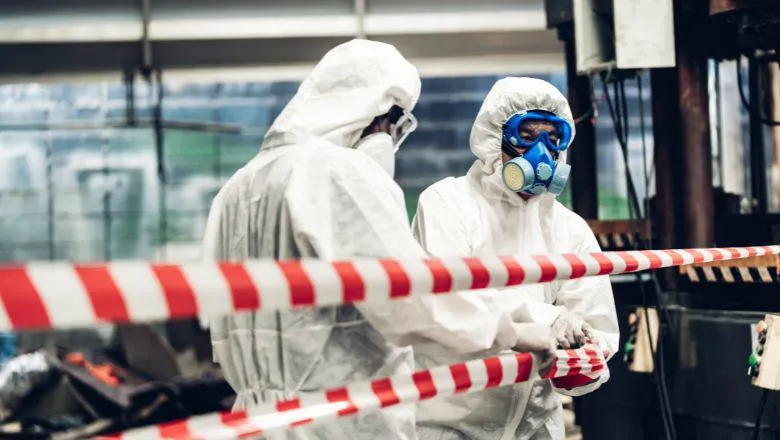In his first official visit to Kyiv on Sunday 24 August, Canadian Prime Minister Mark Carney reiterated his country's financial support of Ukraine. This includes a $3.5 million King's-led project that's working to fight disinformation about weapons of mass destruction (WMDs).

In June, Carney pledged $2 billion in military assistance for Ukraine at the Canadian-hosted G7 summit. His recent speech in Sophia Square, coinciding with Ukraine's 34th anniversary of independence, reaffirmed and expanded on that commitment. One component of Canada's programme of support covers 'security and stabilization assistance'. A key part of this is a project being co-led by King's Associate Professor Dr Filippa Lentzos: 'Countering weapons of mass destruction disinformation.'
The new propaganda war
Disinformation - the deliberate spreading of misleading content to deceive and confuse - can be used to hamper political and economic processes and to erode trust in institutions. In the global theatre of conflict, it's emerged as a powerful strategic weapon, with carefully crafted campaigns often leveraging conspiracy theories already circulating within communities and societies.
It's like you've got the propaganda of the past on steroids."
The project's purpose is to look at how to safeguard our information space. 'The pollution of that space is one of the biggest things that's happening to our societies right now,' Dr Lentzos says. 'It's like you've got the propaganda of the past on steroids.'
Concern about disinformation attacks isn't new. In the EU, awareness and concern spiked after the initial invasion of Ukraine in 2014. This led to the formation of the Foreign Information and Manipulation Interference strategy and the EUvsDisinfo initiative to highlight Russian disinformation targeted at European outlets. But it's attacks and manipulation in the chemical, biological, radiological and nuclear space (CBRN) that have led to an initiative by the G7 Global Partnership focused on countering disinformation that relates specifically to weapons of mass destruction.
In international security policy, disinformation isn't necessarily designed to be believed but to tactically disrupt arms control treaties and agreements. In 2022, for example, Russia made a formal allegation that Ukraine was engaging in 'military biological activities' - shorthand for biological weapons development. As a result, Lentzos explains, 'formal meetings had to be set up, Biological Weapons Convention expert delegations had to wade through hundreds of pages of supposed evidence, detailed rebuttals had to be prepared. Of course there was no actual evidence but it wasted an enormous amount of time and resources, and it kept the political focus away from the Russian atrocities in Ukraine.'

Championing tools to push back against disinformation
Mark Carney's mention of Countering WMD Disinformation sends a powerful message of commitment and support for the project. 'We were obviously very pleased that our initiative was showcased,' says Lentzos.
It shows the importance that Canada and other G7 states put on our work and the importance of collectively responding to disinformation in a strategic way."
With its goal of informing reliably about what's happening in the CBRN disinformation space, the project team is driving data collection and developing innovative tools to support states, governments, institutions and policy makers across the globe to pre-emptively counter disinformation. Educational videos, social media campaigns, briefings, outreach exercises and rapid response pieces, alongside frontline research conducted in Ukraine, all contribute to a growing cache of crucial resources. One example in the final stages of development is a publicly available database of instances where disinformation related to chemical and biological weapons have come up in international security fora. In Lentzos' words, 'a really cool tool' that provides an accessible and interactive timeline. This visual database enables big picture contexts of when disinformation campaigns spike.
King's is carrying out the project alongside John Hopkins Center for Health and Security, One Earth Future's Open Nuclear Network and the Atlantic Council's Digital Forensic Research Lab. As it moves into its second three-year phase, the project's focus will expand primarily to Africa, but also other regions.

Dr Filippa Lentzos is just one example of a King's academic whose research, field experience and casework contributes to an enriched learning experience for our students, giving them insight into the potential real-world application of their studies beyond the classroom. Dr Lentzos currently teaches on multiple modules in the Department of War Studies, including 'Science, Weapons and Arms Control' and 'Future of War'. She also chairs the WHO Technical Advisory Group on the responsible use of the life sciences and dual-use research, is a rostered expert for the UN Secretary-General's Mechanism for Investigation of Alleged Use of Chemical or Biological Weapons (UNSGM), and serves as the NGO Coordinator for the Biological Weapons Convention.






